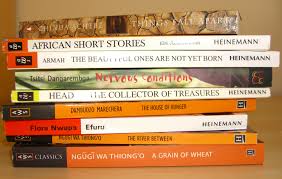Advantages of wide reading

Beaven Tapureta Bookshelf
If you are a bookworm, you will note that coincidences do happen either within a work of fiction or when we have books that somehow have characters acting in the same way or within a certain similar situation. These comparative observations help understand the writers’ techniques, popular themes, draw certain truths about the complexities of life and many more lessons.When we read widely we also learn about today’s trends in Zimbabwean literature. It is therefore disconcerting to know that some of our beginning writers do not read or study local published poetry, fiction or non-fiction and yet they aspire to be successful writers! They forget that originality comes by reading other works. Michael Kardos in his book “The Art and Craft of Writing” (2013) says that “originality is important because it means avoiding what is easy, whether that’s the rehashing of stale plots, characters, and settings, or going along with conventional wisdom, or telling a story the way it’s always been told.” Kardos’ caveat is simple: read widely.
It was in the course of enjoying a recently published motivational book “Take Advantage of Summer: How to Use Your Inner Power” (2017, Forteworx Press) that Bookshelf stumbled upon a passage that shares similar ideas and action with other two recently published books. Interestingly, these similar ideas and action are expressed in different genres, that is, autobiography (No Easy Walk: Inspiring Story of My Life), motivational prose (How to Use Your Inner Power), and fiction (A Beautiful Dream of Ashes). The books do not tackle stale themes, please note, but it helps to comparatively look into them.
“How to Use Your Inner Power”, written by Peter Charumbira Tagwirei is a motivational book which trains individuals to reach high levels of performance in their lives. Like many motivational writers, Tagwirei writes autobiographically and then all the more uses the “instructional” second person point of view to directly speak to his readers. He uses Bible quotes, celebrity stories, and historical events to augment his message. With all due respect, the book deserved a stand-alone review but meanwhile, it has provided impetus for a brief look into how “literary coincidences” either set certain trends or attract discussions on various literary issues such as plagiarism and originality.
The novel “A Beautiful Dream of Ashes” by Chichi A Ngwarati tells the story of Tino and his young sister Caroline who live with an uncaring stepmother. At some point, Caroline is made to spend days without food. Tino then decides to run away from home. Mark the key words: “stepmother”, “without food”, and “running away”. In Dr Cainos Chingombe’s autobiography “No Easy Walk: The Inspiring Story of My Life” (2017), his first job as a boy after dropping out of school due to unavailability of school fees was herding cattle for a certain woman (not a stepmother) who starved him for crimes unknown. Again here mark the words: “herding cattle”.
From the two passages in the books, we learn that child physical abusers use starvation/hunger as one of their means to make sure their young victims submit to their devilish authority. Hunger makes the body lose essential nutrients and this leads to sickness or gradual death. In Peter Charumbira Tagwirei’s “Take Advantage of Summer”, there is a chapter in which he illustrates how he forgave his father and stepmother who used to brutalise him for simple mistakes. Like the fictitious Tino in “A Beautiful Dream of Ashes”, Tagwirei runs away from his abusive stepmother. In these two works, stepmothers are traditionally portrayed as negative forces that scare the children away?
In “No Easy Walk”, it is family poverty that forced Dr Chingombe to drop out of school. Unlike Tagwirei and Tino, he had no memories of a “violent” stepmother at home. He worked as a herd-boy but he hardly got paid. After some time, he went back to school although he was much older for primary school. Now here is the interesting coincidence: Tagwirei, like “the rural boy Cainos” in “No Easy Walk”, drops out of school, leaves home and finds work as a herd-boy and he also hardly gets paid. Later, his brother takes him back home to resume his education. The reader could be struck by the close resemblance of the cattle-herding jobs and “the unpaid salaries” and “the resumption of education” in the two works.
Critics would ask: who plagiarised who?
Yet there may not be plagiarism attempts as these are only coincidental life stories and authors may be so attached to their cattle-herding experiences that they could not be silent about them. However, these two passages show that the plight of herd-boys in the rural areas is an issue not yet attended to. The hired cattle herders in remote areas are working under harsh conditions and going for months unpaid because their job is regarded as unimportant. The actual reading of the three books has more lessons for the reader and writer.







Comments